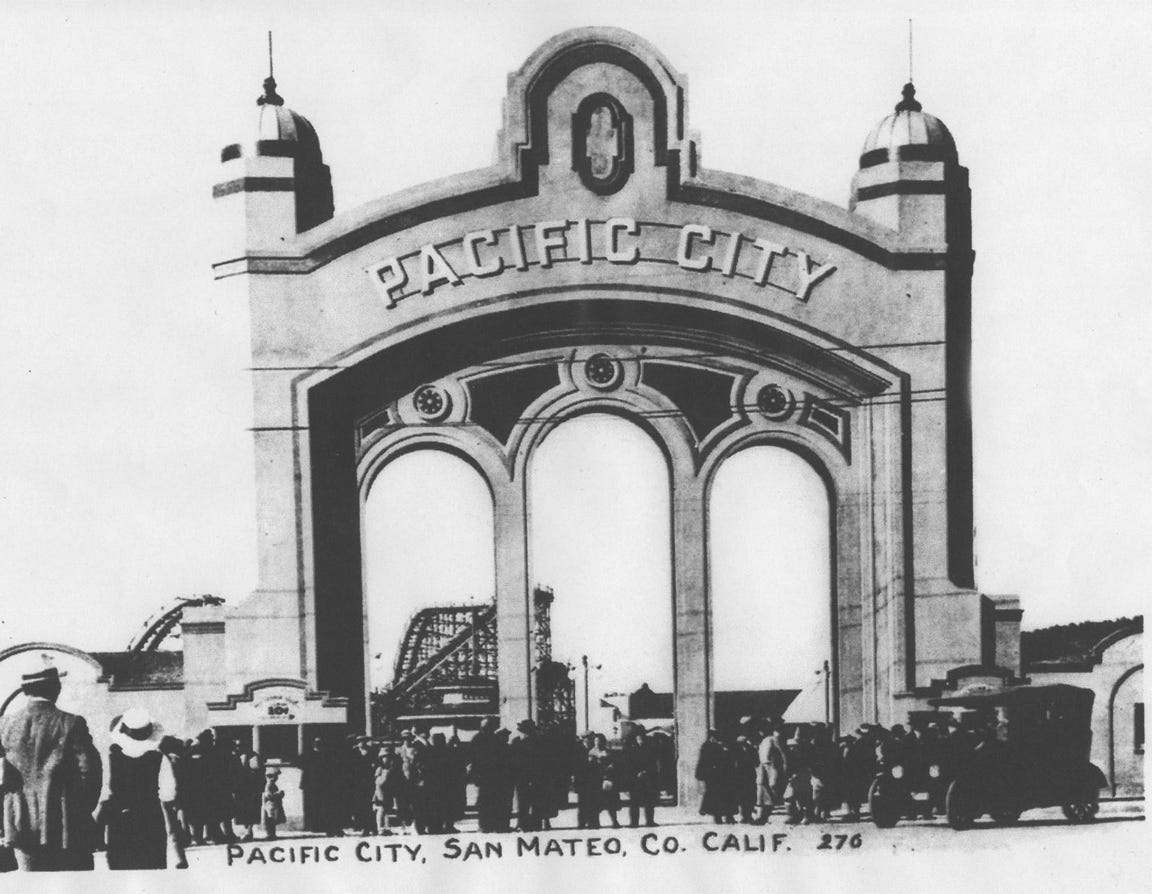My first swim in open water, about ten years ago, was in the shallow, protected waters of Coyote Point, a cove halfway up San Francisco Bay. I was nervous, hyperventilating, wearing too much neoprene, and probably didn’t swim longer than about ten minutes. So how did I get from that point to being able to swim six miles in the open ocean without stopping?
Practice, practice, practice, as the old joke about Carnegie Hall goes. But first I needed to find a swimming buddy or two.
Thanks for reading Postcards from the Waterline! Subscribe for free to receive new posts and support my work.
After that first swim, I knew I wanted more, but I was nervous. I didn't feel comfortable swimming by myself, and I didn't know anyone else who swam in the Bay, apart from a coworker at a previous job. He was notorious for swimming in the San Francisco Bay every morning before work. This guy was a member of the Dolphin Club, one of two century-old athletic clubs on the shore of Aquatic Park, near Fisherman’s Wharf, and he was rumored to be a fast and accomplished distance swimmer. At the time I assumed (wrongly) that the Dolphin Club and the South End Rowing Club right next door to it were accessible only to the brave, the strong, and the rich — and I was none of those. This former coworker was also an excellent singer and had once performed the national anthem before a crowd of baseball fans at a Giant's game. In other words, it seemed like he lived on a different plane of existence than me, who could barely carry a tune in a basket and had trouble swimming more than 100 yards in a pool without getting winded. The fact that he swam nearly every day and still showed up to work apparently healthy and un-eaten by sharks proved that open-water swimming was possible, and his example inspired me. But since we weren’t friends, I didn’t feel comfortable approaching him for advice.
Even if he had welcomed me into his club (and in retrospect he probably would have), it didn’t seem like a convenient option for me. I live forty minutes south of Aquatic Park in the best traffic conditions, whereas Coyote Point is a mile and a half from my own house, and it has a convenient beach for easy entry, a short stretch of tree-covered, rocky coastline for pretending you’re swimming in the wild, and a killer view of San Francisco’s skyline in the distance.
So I tried to rally people closer to my neighborhood. I crafted a Craigslist ad with the title "Let's go swimming in the Bay!" I acknowledged the ridiculousness of what I was proposing, but I also sold the idea: Yes, it was cold, but it was also beautiful, generally calm water, and it was free — particularly if you got there before 8am, which was when the park rangers opened up the gatehouse by the entrance road and started charging $5 per car. Also, it was early October, which meant the water was as warm as it gets: Only a little colder than most outdoor swimming pools, comfortable enough to swim without a wetsuit (though many people wear wetsuits anyway).
Posting a Craigslist ad like that is sort of like putting a message in a bottle and setting it adrift on a sea of randomness and monsters. I didn’t know what kind of weirdos I’d be hearing from. But the response was underwhelming. One random person emailed to say he was interested, but then stopped responding to my emails. Maybe he was just as nervous as I was.
But then I heard from Don, a Silicon Valley entrepreneur and marketing professional who I'd known for about a decade but hadn’t seen recently. He’d come across my ad and, wanting to encourage himself to keep swimming regularly, decided to get in touch.
We settled on the following Saturday morning, and agreed to meet at the parking lot by the beach. There weren’t a lot of amenities there — just a too-small parking lot and an old, battered bathroom building with a single beach shower outside it. The designated swimming area was marked off by a line of ancient wooden pilings about 50 yards offshore.
I arrived a little early, so I got out of my car and walked over to the beach, sipping my coffee and staring at the sea.
Along the beach itself was a row of rotting stumps even more ancient than the pilings offshore. I learned later that these were all that remained of a boardwalk built there in the late 1920s, in one entrepreneur's ill-fated attempt to create a "Pacific City" as the West Coast's answer to Atlantic City. It lasted for one glittering season before going bankrupt; patrons apparently didn't care for the chilly winds that came howling off the Bay in the afternoons and evenings, nor for the stench of sewage from the outflow pipes slightly north of the beach.

By the 21st century, there was nothing left of Pacific City except those rotting pilings and a historic marker near a board sports shop that was boarded up most of the year. An asphalt walkway separated the parking lot from the beach, although at points the waves had undercut the surface and it was crumbling down into the sand. In other words, it was a beach, but it was a well-neglected one.
The afternoon winds persist to this day. But the sewage problem wasn't corrected until Baykeeper, a nonprofit organization defending the environmental health of the Bay, filed a lawsuit in 2007. Baykeeper forced the adjacent city of Burlingame to stop letting raw sewage overflow into the water of Coyote Point.
I didn’t know all this when I started swimming there in 2012 — in fact, I had no idea about the history of the San Francisco Bay. It was only later, when I started doing research, that I learned about the decades of hard work, activism, and legal action that had gone into making many different parts of the Bay reasonably clean and safe. All that cleanup work meant that Don and I could swim in these waters without getting a horrible stomach bug, a skin rash, or worse. It also meant that Coyote Point smelled reasonably nice.
The benefits didn’t accrue only to me and other swimmers. In 2020, Facebook (now known as Meta) opened a new campus alongside the former sewage outlet, a development that may not have happened if the place still stank.
After I stood there musing for a few minutes, Don arrived, right on time, in his big SUV. His smiling face pulled me out of the past and onto the present challenge: Swimming.
Don had a little more experience with open-water swimming than I did; he'd been training with his son for Sharkfest, an annual Alcatraz swim. I was glad to have a friend who was comparatively more experienced, but not yet at the stage where he was swimming marathons. Don’s smile and easy conversation put me at ease as I gulped down a few more mouthfuls of coffee.
After some chit chat, we wrestled ourselves into wetsuits in the parking lot, closed up our cars, and picked our way down to the waterline, careful not to slip on the rocky beach or impale our bare feet on the rotted timbers of the old boardwalk.
And then we swam.
grey silt —
a bit of the bay
with me all day
Thank you to Julia Hess, Alicia Kenworthy, and Sara Campbell for editing help on this post, via Foster.co.
Thank you for reading Postcards from the Waterline. This post is public so feel free to share it.
Subscribe for free to receive new posts and support my work.



